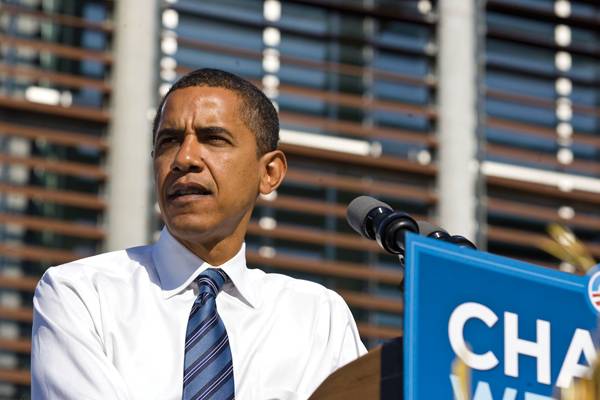HASENMILLER: An efficient stimulus

President-elect Barack Obama speaks to the crowd in downtown Des Moines on Oct. 31, 2008. File Photo: Shing Kai Chan/Iowa State Daily
January 12, 2009
President-elect Barack Obama has created a plan designed to help get our economy out of recession. He has said that he “expect[s] to be able to sign a bill shortly after taking office.” Nancy Pelosi hopes to have a bill ready by Inauguration Day.
Obama’s goal is to save or create at least 3 million jobs with this plan. The trick is, to help the economy, these jobs must be economically efficient. In other words, the output of the job — what is produced — must be more valuable than the inputs — the labor and the capital. Creating any old job won’t do the trick. For example, when President Franklin D. Roosevelt paid millions of people to build parks during the Great Depression, it actually hurt the economy because nobody needed parks. They needed all the things that the people would have been producing had they not been so busy building parks instead.
Obama’s plan will cost $800 billion, including about $300 billion in tax cuts. The tax cuts involve a smaller amount being withheld from paychecks for the next two years, rather than giving out one large check the way the President Bush did it. The savings will amount to $500 per person per year.
The idea is that giving people more money, will encourage them to spend that money. This means there will be an increase in demand for various products, and therefore the supply of those products will also be increased, thus creating jobs to produce that supply.
This is, at least in comparison to most of Obama’s ideas, fairly intelligent. However, there are ways the idea could be improved. Instead of giving a set amount to each person’s paycheck, it would be more beneficial to simply lower the tax rate altogether. There are three reasons for this:
First, since your tax cut would be proportional to the amount of money you would make, people would be encouraged to work longer or harder in order to secure a raise, because a lower tax rate would mean that you would get to keep a higher percentage of that raise.
Second, a lower tax rate would be seen as more permanent than Obama’s plan. When people know their tax cut is a one-time deal, or even that it will come to an end in a couple of years, they are less likely to spend the money right away and more likely to save it for a rainy day — counterproductive for Obama’s philosophy. This is especially true during a recession when rainy days are more common.
Third, a tax cut would give greater amounts of money to the rich, who are much more likely to invest that money rather than simply spending it, and investment is far more effective in creating jobs than consumption is.
For example, if the investment money is used to expand a business by putting up an additional building, people must be hired to physically build that building, to produce the materials used to make it, to supply power and water to it, to heat or cool it, to create whatever machines it requires, to deliver all of the materials necessary for this, and much more. So the money will still go to the people and create a demand for various products, but there will also be an expanded business in the end, which can hire additional workers, thus creating even more jobs.
Still, Obama’s tax cut plan is a step in the right direction. Unfortunately, personal tax cuts only account for about $150 billion of the $800 billion plan, and the rest of it is not so good.
Obama also plans to give over 100 billion dollars in tax cuts to businesses. But not all businesses. Just the ones who either hire new workers or forgo layoffs. Though there could be some positive effects to this, picking and choosing is not the way to go.
Remember that creating jobs is only good when those jobs are economically efficient.
If you give a business incentive to hire workers who are unable to produce as much as
they cost, you are not being efficient. You are wasting resources. That person would be better off doing something else. And the money that you use as an incentive to be inefficient comes at the expense of taxpayers who are being efficient. Taking money from the productive and giving it to the unproductive is never a good economic strategy.
Another $77 billion dollars would go toward extending unemployment benefits and subsidizing heath care for those who lose their jobs. This does nothing but encourage people to stay unemployed by decreasing the cost associated with it, which does the exact opposite of what Obama intends. The rest of the money will go toward things like roads, bridges, and alternative energy.
The likely effect of this, according to economist Walter Williams, is an increase in inflation caused by pumping too much money — stolen from productive taxpayers, of course — into the economy. It will also considerably increase our national debt, which we already paid $237 billion of interest on in 2007.
The economy is perfectly capable of sorting itself out without excessive government intervention.
A much better economic stimulus plan would be this: Cut the tax rate and be done with it.
– Blake Hasenmiller is a senior in industrial engineering and economics from De Witt.
















